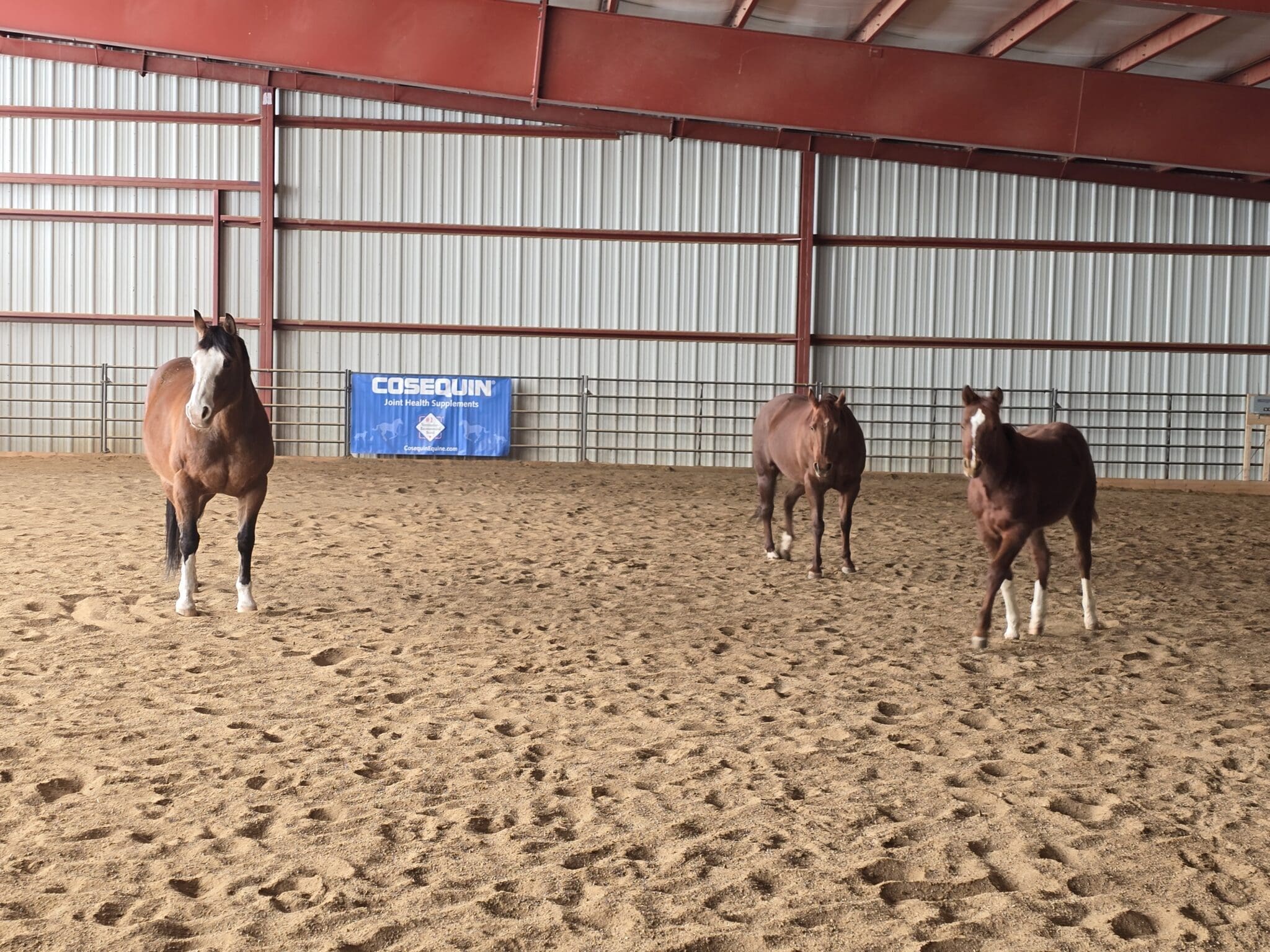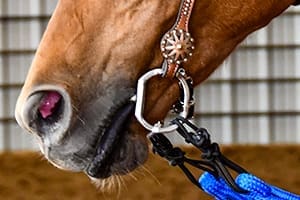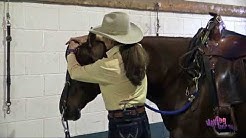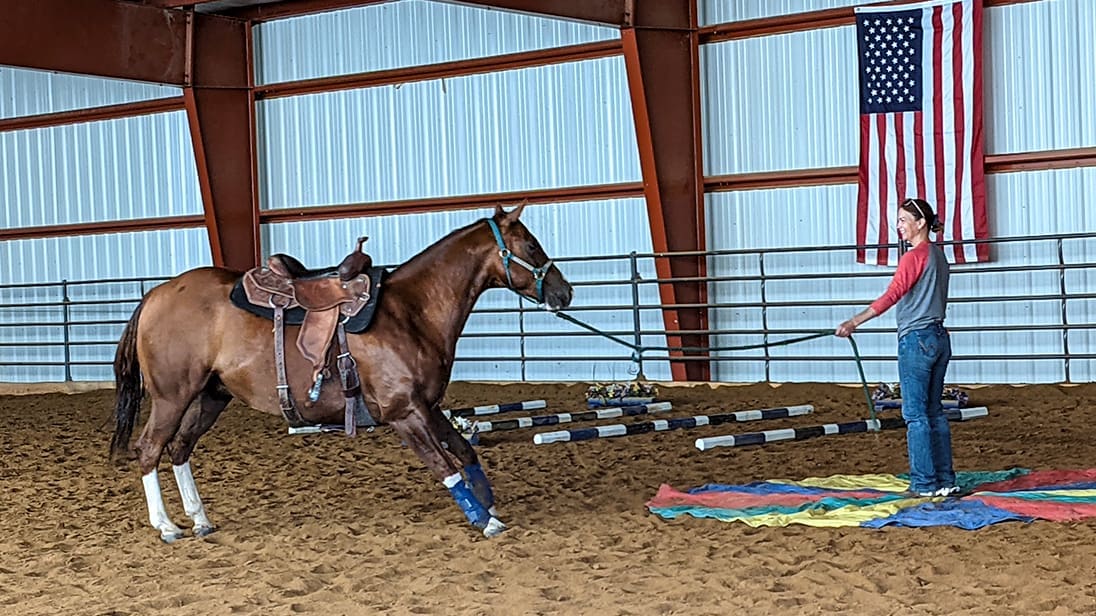
My young horse, Pepperoni, was just a tender 2-year-old with about 30 days undersaddle when I first ventured outside the arena with him. On that day, my number one goal was to make sure he had a positive experience, so I enlisted the help of a friend with a seasoned, calm gelding to act as a good role model. But as luck would have it, shortly after venturing outside his known universe, we encountered a horse-eating monster that both horses feared.
The toppled-over trash trash can was sticking halfway out onto the dirt road we were riding on, the lid free floating and wavering slightly in the breeze—just the kind of thing a horse would have trouble deciphering. Clearly, to a horse, it was a danger of the worst kind—unknown and unidentifiable. I knew for certain that the way both horses negotiated this scary obstacle would have lasting impacts on my young horse’s development.
One minute we were happily on an adventure, then the lead horse perked his ears and balked at the trash can, causing Pepper to think twice about how much fun this adventure would be. Expecting the worst, I immediately deployed my trademark de-spooking techniques and started the game to convert his fearful behavior to curiosity.
Pepper took the bait right away, his willingness to approach the scary object growing. His delight in the praise that followed him touching the trash can with his nose sealing the deal. On the very first time this young horse spooked under saddle, I was successful in converting his fear to investigative behavior.
Now a well-trained 5-year-old that has climbed all over the high mountain trails, Pepperoni has had occasion to be fearful, but he always responds in the same way—the way he learned to manage his fear on his first time out.
Contributing Factors That Lead to a Horse’s Fear
There are certain situations where a normally calm and confident horse can become anxious. Understanding the scenarios where this is likely to happen helps the rider be proactive, stay in control, and even alleviate the horse’s fear before it panics.
A horse’s fear can be triggered suddenly, as in the case of a deer jumping out of the brush, or it can build slowly as the horse’s anxiety increases, until at some point the horse meets a thresh-hold that causes meltdown. Being aware of changes in the horse’s emotional state helps a rider take action to alleviate anxiety before it reaches threshold.
As herd animals, horses find safety in numbers, and the thought of being alone to face danger is overwhelming to many horses. The same horse that is calm and confident on the trail in the company of other horses can turn into a scared rabbit when out alone. Only horses that are confident, experienced, and well-trained will handle riding alone into strange environments.
Along the same lines, horses will obviously have more fearful behavior in areas they are unfamiliar with than they will in known environments. The same thing is true of riding with unknown horses (stranger danger). Again, with more training and experience, and a confident rider holding the reins, horses will build confidence over time (we call it seasoning) in new environments or when riding with strange horses.
Additionally, “fresh” horses that have not had much riding lately may be lacking confidence, and may also be over-reactive to stimuli. But horses can display more anxiety than normal for more hard-to-understand reasons (like pain or changes in herd dynamics). Also, when something inexplicably changes in a horse’s well-known environment (like a new banner hanging on the arena fence that wasn’t there yesterday), it can cause a dramatic reaction.
Every horse is a little bit different in what causes its fear and how it responds in these types of situations. The more experience a rider has with a horse, the easier it is to predict the situations that will trigger fear.
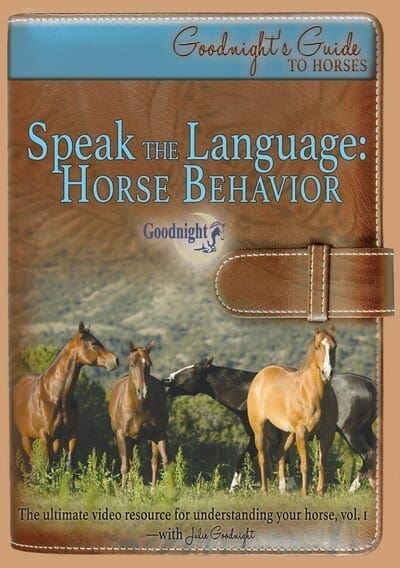
Speak the Language: Horse Behavior
The Ultimate Resource for Understanding your Horse
Learn the unique characteristics of a horse’s natural behavior so you are safer, more effective and can better relate to the needs of your horse.
Desensitizing vs. De-spooking
Often people confuse desensitizing and de-spooking. When done correctly, it’s easy and fast to desensitize a horse to scary or aversive stimuli, like fly spray, the water hose, or clippers. I prefer the desensitizing technique known as “advance and retreat.” In just a few minutes, I can eliminate the horse’s fear of that stimulus. During desensitizing, with repeated advances of the scary stimulus, the horse knows the scary thing is coming and is prepared.
Spooking generally occurs when the horse is in an unknown situation and the unexpected happens. This is quite different from the controlled setting in which desensitizing occurs. It’s not really possible to “spook-proof” or “bombproof” a horse, but by using my de-spooking techniques, it is not hard to teach them to gain confidence by converting their fear to curiosity.
Fear vs. Curiosity
As prey animals and as flight animals, horses naturally have a high level of fear in new situations or stimuli. While some horses are more prone to flight than others, fearful behavior is instinctive, and it is what keeps them alive. But horses are also instinctively curious and investigative once fear has been ruled out.
Through training, we can teach horses to convert their fear to curiosity—by ruling out flight, letting the horse know it’s safe, and waiting for the moment he turns his attention forward. While training won’t change a horse’s temperament, it will teach the horse to manage its fear differently and help the horse find confidence.
Important Skills for the Rider
How the rider responds to a horse’s anxiety can make or break the situation. Having a proper, balanced position in the saddle, being centered with the horse’s center of gravity, and sitting in a relaxed manner, not only instills confidence in the horse, but also allows the rider to move fluidly with the horse when the horse becomes reactive.
Having quiet hands that are reaching well forward and giving, rather than clenching and grabbing helps a horse remain calm and focused. Imagine how the horse feels when it begins having anxiety and then its mouth is grabbed unexpectedly, causing it pain. Transmitting fear through the reins is very common and rarely has a good effect.
Furthermore, developing good rein handling skills is important in all matters of riding—that means knowing how to properly hold the reins, what the correct rein length is for the situation, and how to shorten and lengthen reins easily and quickly, without looking or fumbling. Knowing how to use the tools properly is critical to success.
Most importantly, to successfully manage fearful behavior in a horse, the rider or handler must have the ability to keep thinking and keep riding (or keep connected with the horse from the ground).
React, But Don’t Over-React
One should always be prepared to deal with sudden reactions from the horse, particularly when riding in an uncontrolled or unknown environment. That means having good situational awareness (paying attention to your surroundings), monitoring the horse’s emotional state, having the correct rein length to respond appropriately, and knowing how to execute the emergency stop.
One of the most valuable skills a rider can deploy when a horse becomes fearful is to keep riding, keep communicating with the horse, and stay in the moment—rather than freeze up like a deer in the headlights.
When a rider freezes up, clamps on the reins, or simply becomes passive, things rarely go well. Instead, taking the initiative to guide the horse through its fear, giving it clear cues to keep a dialogue going, and redirecting the horse’s focus will allow the rider to stay in control—and let the horse know it’s safe.
The worst response to a horse’s fearful behavior would be for the rider or handler to act afraid. If the horse’s behavior triggers the flight-or-fight response in the rider, it validates and exacerbates the fear. As herd animals, horses tend to adopt the emotions of those around them. So when the rider shows fear, the horse reacts in kind.
The opposite is also true—if the rider takes a deep breath, sits back and relaxes, acting as if there’s no problem, it transmits a lack of concern and instills confidence in both horse and human.
Fearful Behavior Can Be Managed
Riding in balance, with a relaxed back, deep seat, and an open pelvis will make riding out a serious spook much easier. Having good situational awareness and managing rein length helps a rider be prepared to deal with almost any reactive behavior from the horse. Teaching a horse that flight is not an option, and that curiosity will always be rewarded, will go a long way to eliminate flight behavior.
Having all the skills and knowledge you need to be safe on a reactive horse may seem foreboding, but it is attainable. Knowing how to respond to a spook will yield great confidence—for you and your horse—in all riding situations.

